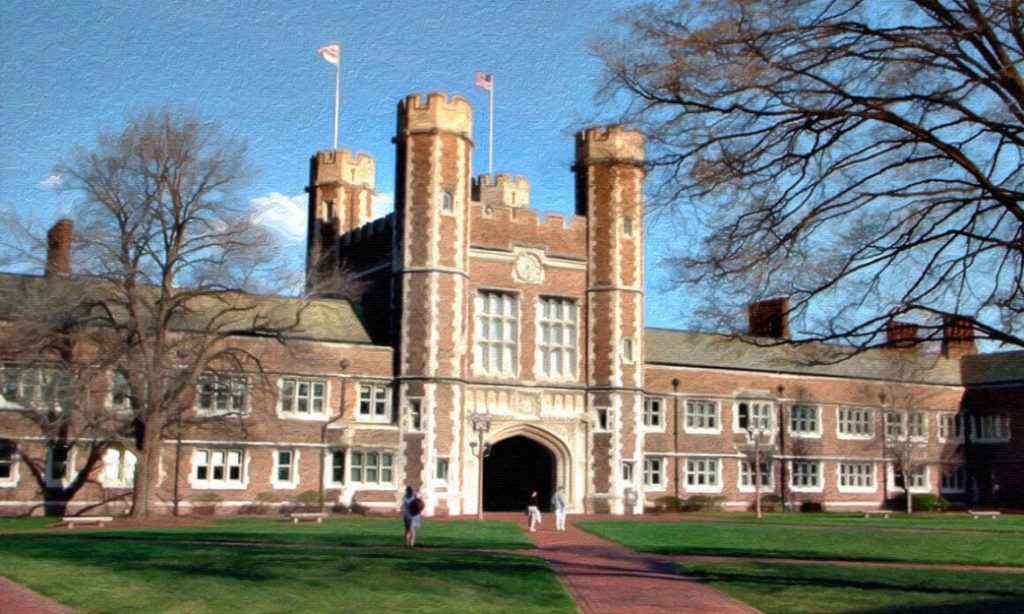| Rank | School | Location |
|---|---|---|
| 1 | Columbia University In The City Of New York | New York, NY |
| 2 | Massachusetts Institute of Technology | Cambridge, MA |
| 3 | Harvard University | Cambridge, Massachusetts |
| 4 | University of Minnesota - Twin Cities | Twin Cities, MN |
| 5 | University of Wisconsin-Madison | Madison, WI |
| 6 | Washington University - St. Louis | St. Louis, MO |
| 7 | Cornell University | Ithaca, NY |
| 8 | Georgia Institute of Technology | Atlanta, GA |
| 9 | University of Pennsylvania | Philadelphia, PA |
| 10 | Duke University | Durham, NC |
This is a ranking of the 10 Best Bachelor's in Biomedical Engineering Programs in the U.S.
This ranking is designed for biomedical engineering students to make informed college and degree decisions who want to study at the top undergraduate schools.
This field is growing and competitive, committed to researching and engineering principles and cutting-edge technology to implement in medical practice. Biomedical engineers are responsible for many life-saving medical revolutions, like surgical robots, medical devices such as advanced prosthetics, and even genetic engineering for artificial organs.
Biomedical engineers are responsible for many life-saving medical revolutions, like surgical robots, advanced prosthetics, and even genetic engineering for artificial organs.
Graduating as a Biomedical Engineering major can possibly launch your career into multiple fields that are growing in scope and need. Biomedical engineering majors learn a combination of skills.
These skills combine healthcare and engineering, including software or hardware engineering, equipment testing, medical device engineering or sales, or biomedical engineering research and development across industries.
A biomedical engineering major can graduate and potentially enter the workforce immediately with this degree, or continue on to graduate degrees.
Biomedical engineering research includes bioinstrumentation, biomechanics, genetic engineering or medical imaging, to name a few.
Many biomedical equipment technicians or quality engineers begin with this degree. The cross-field knowledge you'll gain will lend itself well to a variety of career options.
Biomedical Engineers earned an average median salary of $100,730 in 2023, according to the Bureau of Labor Statistics. The projected job growth rate is 5%, adding an additional 1,000 jobs in the next ten years.
Schools may download our badge.
The 10 Best Bachelor's in Biomedical Engineering Degree Programs
Columbia University In The City Of New York
New York, NY

Columbia University established the Biomedical Engineering Department in 2000 which offers a full range of degree programs, from undergraduate through doctoral studies. Dual graduate degrees are also available in conjunction with the Columbia University Medical School.
The Bachelor of Science in Biomedical Engineering provides students with a solid foundation. In the classroom, students of the biomedical engineering program practice applying these scientific principles to specific biological and medical problems. Students may broaden their educational experience through a variety of interdisciplinary electives.
Graduates are ready to engage with the career world in medical centers, research institutes, or large-scale industrial facilities dealing with medical devises, artificial organs, medical imaging, pharmaceuticals, and more. Students may also consider further education.
The department maintains strong research interests in the areas of Biomechanics, Biosignals and Biomedical Imaging, and Neuroengineering.
Credit requirements: 128 credits
Selection of classes:
- Quantitative Physiology
- Biostatistics for Engineers
- Tissue Engineering
- Drug and Gene Delivery
- Biomedical Imaging
Learning enrollment options: Full time only
Massachusetts Institute of Technology
Cambridge, MA

At MIT, the Department of Biomedical Engineering strives to educate creative and progressive leaders in the field.
MIT offers the Bachelor of Science in Biomedical Engineering.
There are several areas of concentration available. These include cancer biology, environmental and toxicological studies, and microbiome and infectious disease.
Graduates are prepared for entry level career positions in research or project-oriented product development or may pursue higher education.
The department remains a leader of research in several areas of biological systems. These include microbial systems, toxicology, transport phenomena, biomaterials, and more.
Credit requirements: 180 credits minimum
Selection of classes:
- Ethics for Engineers
- Living Machines
- Metakaryotic Biology and Epidemiology
- Fundamentals of Drug Development
- Molecular, Cellular, and Tissue Biomechanics
- Microbial Genetics and Evolution
Accreditation: MIT receives accreditation from the New England Commission of Higher Education (NECHE)
Harvard University
Cambridge, Massachusetts

Harvard University offers three relevant undergraduate degrees:
- Bachelor of Arts in Biomedical Engineering
- Bachelor of Arts in Engineering Sciences - Biomedical Sciences and Engineering Track
- Bachelor of Science in Engineering Sciences - Bioengineering Track (accredited by ABET)
The BA programs focus more on life sciences and requires 14 to 16 classes. This curriculum benefits those interested in pursuing medical school and gaining a career as a practicing physician.
The BS emphasizes more traditional engineer education and requires up to 20 classes. This most benefits those interested in pursuing job opportunities in the medical devise industry.
Graduates from both programs have succeeded in medical school, graduate school, and entry level career positions.
Credit requirements: 14 - 20
Selection of classes:
- Science Technology and Society
- Biological Signal Processing
- Drug Delivery
Accreditation: Harvard University receives accreditation from the New England Commission of Higher Education.
University of Minnesota - Twin Cities
Twin Cities, MN

The Bachelor of Biomedical Engineering (BBmE) through the University of Minnesota has nine focus areas from which to select, including Biomaterials, Digital Health, and Neural Engineering. These focus areas allow tailoring the education to meet career goals.
The core BBmE curriculum focuses on solving health problems through the use of math, physics, chemistry, and biology. In their last academic year, seniors take a design course that pairs each student with a practicing industry professional. Those seeking further hands-on coursework may take the senior design class along with the Engineering Co-Op.
A dual BBmE/Master's is also available.
Credit requirements: 124 total credits
Selection of courses:
- Biomechanics
- Bioelectricity and Bioinstrumentation
- Biomaterials
University of Wisconsin-Madison
Madison, WI

The Department of Biomedical Engineering at the University of Wisconsin maintains a unique hands-on curriculum throughout the Bachelor of Science in Biomedical Engineering. Complete design projects and participate in laboratories with each core class. Areas of specialization are available in Bioinstrumentation, Medical Imaging, Biomechanics, and Biomaterials/Cell/Tissue Engineering.
Additional hands-on opportunities come in the forms of industry cooperatives/internships and study abroad options. Pre-med classes are also part of the curriculum for those who wish to pursue further education.
Credit requirements: 128 credits minimum
Selection of courses:
- Medical Instrumentation
- Computers in Medicine
- Signals and Systems
- Radiological Physics and Dosimetry
- Polymeric Materials
- Occupational Ergonomics and Biomechanics
- Rheology of Foods and Biomaterials
- Stem Cell Bioengineering
Washington University - St. Louis
St. Louis, MO

Since 1997 the Department of Biomedical Engineering at Washington University has offered cutting-edge programs and research in the field. A full range of academic programs are available to students, from the Bachelor's to Doctoral levels. At every level, the Department seeks to advance technology to the benefit of human well-being.
The Bachelor of Science in Biomedical Engineering prepares students for several career paths including entry level positions in the work force, further education in the field, or a professional degree such as a practicing medical doctor. After the first two years of foundation classes, students can then tailor their education to meet their career goals with specialized higher-level courses.
For hands-on experience students may participate in summer experiences, independent studies, and study abroad opportunities. Additionally, the department maintains six distinct research areas including Biomedical and Biological Imaging, Molecular and Cellular Systems Engineering, and Orthopedic Engineering.
Credit requirements: 120 total credit hours
Selection of courses:
- Biomechanics
- Bioengineering Thermodynamics
- Molecular and Cellular Engineering
- Biomedical Instrumentation
- Orthopaedic Biomechanics -- Cartilage/Tendon
- Design of Artificial Organs
Length: Four years
Accreditation: The program receives accreditation from the Engineering Accreditation Commission of ABET.
Cornell University
Ithaca, NY

At Cornell University, the Bachelor of Science in Biomedical Engineering provides a comprehensive curriculum to undergraduate students. Gain technical knowledge and professional experience that is key for entry level career positions.
There are four areas of concentration available for students to further customize their educational experience: Molecular/Cellular/Systems Engineering, Biomaterials and Drug Delivery, Biomedical imaging and instrumentation, and Biomechanics and Mechanobiology. Students may go on to pursue the Master of Engineering or the Doctoral program both also available at Cornell.
Research facilities include Cornell Magnetic Resonance Imaging Facility, Cornell Neurotech, and the Institute for Biotechnology and Life Science Technologies.
Credit requirements: minimum of 39 credits for the major
Selection of classes:
- Biomedical Transport Phenomena
- Physiology of Human Health and Disease
- Biomolecular Thermodynamics
- Electrical and Chemical Physiology
Accreditation: Cornell University receives accreditation from the Middle States Commission on Higher Education.
Georgia Institute of Technology
Atlanta, GA

The Bioengineering program at Georgia Tech strives to educate creative leaders willing to use a solid foundation in engineering and the life sciences towards the advancement of the healthcare field. The curriculum encourages practical, hands-on problem-solving and design experiences that integrate the theories of the classroom with real-world healthcare challenges.
The Bachelor of Science in Biomedical Engineering teaches a foundation in engineering, math, and the sciences before specializing their degree with higher level courses. The curriculum utilizes problem-based learning (PBL) methodologies to encourage teamwork, problem solving, and self-directed learning.
Students may participate in the undergraduate five-year co-op program that integrates paid, practical work experience into the curriculum, the international plan for study abroad experiences, or the research option for 'a concentrated research experience, culminating in an undergraduate thesis'.
Credit requirements: 131 total credit hours
Selection of required classes for the major:
- Systems Physiology
- Biotransport
- Biomedical Systems and Modeling
- Physiology of Cellular and Molecular Systems
Start dates: First year students may apply to the Summer or Fall terms only
Accreditation: Georgia Institute of Technology receives accreditation from the Southern Association of Colleges and Schools Commission on Colleges.
University of Pennsylvania
Philadelphia, PA

The University of Pennsylvania offers two undergraduate degrees in bioengineering, the Bachelor of Science in Engineering in Bioengineering (BSE) and the Bachelor of Applied Science in Biomedical Science (BAS).
Each degree consists of the same required general classes for the first two years, allowing students the time and flexibility to choose between the two.
The BSE program is a more traditional degree for students who wish to pursue careers in professional engineering. Students who want to continue with graduate studies do well in this program. This track is ABET accredited.
The BAS program is more flexible and allows students multidisciplinary studies and dual degrees more easily. Students interested in pre-medical education do well in this program. This track is not ABET accredited.
The following program information corresponds to the BSE requirements:
Credit requirements: 40.5 course units
Selection of required courses:
- Intro to Bioengineering I and II
- Biomechanics
- Biomaterials
- Bioengineering Signals and Systems
- Engineering Physiology
- Cell Engineering
- Biotransport
Length: Four years
Accreditation: The BSE degree in Bioengineering receives accreditation from the Engineering Accreditation Commission of ABET
Duke University
Durham, NC

Consistently nationally recognized, the Bachelor's in Biomedical Engineering at Duke University provides a strong emphasis on research and entrepreneurship. Areas of specialization are available in:
- Biomechanics
- Electrobiology
- Biomolecular and tissue engineering
Gain experience with designing and conducting experiments, effective communication within multidisciplinary teams, engaging with contemporary engineering issues, working with professional and ethical responsibility, and much more.
Access to several personal and educational advancement opportunities including internships, independent studies, and a Bachelor/Master combination are available.
Selection of courses:
- Mechanical Engineering and Material Science
- Biomaterials
- Modeling Cellular and. Molecular Systems
- Intro to Medical Instrumentation
Admissions and transfer credit information: First year applicants must submit high school transcripts, standardized testing scores, a one-page personal essay, and three letters of recommendation.
Accreditation: Duke receives accreditation from the Engineering Accreditation Commission of ABET.
In this ranking we looked at the universities which have the most influence based upon academic publications and citations from university faculty and alumni, as reported by AcademicInfluence.com.
We then specified and reviewed the bachelor's programs in particular, ranking the comprehensiveness of the programs, the degrees offered, variety of coursework, hand-on instruction (facilities and labs), and academic reputation. For more ranking methodology information see our College Denominator.
What do Biomedical Engineers do?
A biomedical engineer will solve problems and improve quality of life for human health, using applied sciences and engineering principles. Research opportunities in the physical sciences as a biomedical engineer include biological sciences, regenerative medicine, and biomedical applications.
What do Biomedical Engineering students learn?
This is an interdisciplinary field, and provide students advanced courses in biological systems, engineering design, health care, medicine, and learn knowledge of mechanical properties and materials to improve people's quality of life. They will often complete research projects. Advanced degrees are available as master's degrees. These programs may have a capstone project requirement.
